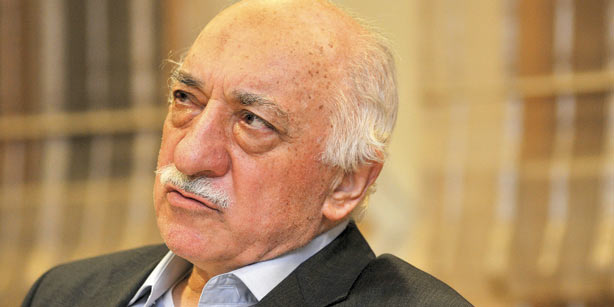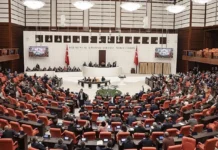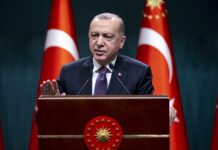Vahap Coşkun
The Turkish original of this article was published as
“Kolektif kandırılma” on 10th August 2016.
Of course Erdogan and the AKP have played their part in enabling the Gülen Congregation to flourish. About this, there can be no doubt. But blaming only the AKP for 15th July is not fair either.
Mistakes made — and admitted — by Erdogan and the AKP can and should be put under the spotlight. There is nothing wrong with that. But it would be wrong to stop the analysis at this point. What has been happening cannot be fully grasped through a Gülen analysis focusing only on the AKP and Erdogan. The point the Gülenists had reached by 15th July cannot be explained just by mistakes, shortcomings or lack of foresight on the part of a single political party. It is not so simple.
The Gülen Congregation has come to wield immense power. To understand how they attained this position, surely without ignoring Erdogan’s and the AKP’s role we must nevertheless also look at what was happening at other times and with other political parties. It has to be said that no political leader whatsoever cold-shouldered Gülen’s ideas and his congregation’s activities. The support provided by all political parties and governments in the aftermath of the 12th September 1980 coup — with the sole exception of Erbakan — is a case in point.
Why was Gülen appreciated by both the centre-right and the centre-left? What was the motive that drove both right-wing and left-wing governments to aid and assist Gülen, and to collaborate with him whenever needed? I believe the reason can be found in the way Gülen’s ideas were able to integrate conservatism, nationalism, and a kind of religiosity that took secularist sensitivities into account.
“A golden generation”
One of the most significant aspects the Gülen Congregation displayed was their focus on education. Gülen was seen as raising a generation that upheld its proper faith, adhered to its moral values, propounded conservative values, and upheld nationalist principles. He was teaching Turkish all over the world, getting children of all countries to speak Turkish through his Turkish Language Olympics, and raising the Turkish flag to new heights. This golden generation was always going to stand by and serve the Turkish state.
Conservative-nationalist masses also widely appreciated the upbringing provided for what became educated, well-read, well-mannered young people who could handle themselves in polite society, who were both literate and articulate, and who were likely to join and rise through the bureaucracy. The fact that the children of a social stratum long excluded from the upper echelons of the state were now — in one way or another — able to enter those ranks was greeted with joy and enthusiasm, with those children being patted on the back and encouraged to go further. The state was being transformed, and Gülen’s young people were an embodiment of this transformation. This was the reason underlying the unprecedented favor showered on the Gülen schools and special prep courses.
There was no way centre-right leaders were going to ignore this potential, and indeed they did not. Turgut Özal made a serious contribution to the Gülen Congregation’s post-1980 evolution. In return, Gülen repeatedly expressed his appreciation of Özal’s role in protecting his congregation from a probable 12th September crackdown. Süleyman Demirel was particularly in synch with Gülen’s need to open up to the outside world, writing to numerous heads of state to ask for matters to be facilitated vis-à-vis Gulen. When they were in government, both Mesut Yılmaz and Tansu Çiller, too, tried hard to clear the way for Gülen.
A man of the left who became infatuated with the Congregation
Yet another of the Gülen Congregation’s many faces was so-called “moderate Islam.” Gulen emphasized tolerance, worked to promote dialogue between different faiths, and presented an appearance of respect for secular/secularist attitudes in Turkey. On an issue of such deep concern for the faithful as the headscarf ban, for example, he refrained from pressing hard, and intimated that he regarded such insistence as erroneous. He also confronted Erbakan when he became a special target for Kemalist secularists, winning their hearts by telling public Islamism’s traditional leader: “You have failed, now get out, just leave and go.”
This sort of performance provided the congregation with two advantages: On the one hand, it created and expanded a halo of sympathy for it in the West. The effort to train individuals at peace with the West, who, far from being at odds with Western values, had actually assimilated and internalized them, increased Gülen’s room for manoeuvre in the Western world.
At the same time, it also enabled him to relate to the centre-left in Turkey. Gülen was in particularly close contact with Ecevit, who both appreciated Gülen’s sensitivity vis-à-vis secularism, and wanted to demonstrate to the general public, through this alliance with a religious congregation, that the left had no problems with religion, and that he personally was a leftist who respected religion. He therefore held the Gülen Congregation in high esteem, protecting and supporting them.
In this context, extremely noteworthy is the testimony of Ankara’s ex-police chief Cevdet Saral. In 1998 Saral appears to have asked the then-prime minister Mesut Yılmaz for permission “to conduct an investigation into Congregation cadres within the state.” Yılmaz stopped him, saying “No, don’t! Ecevit is infatuated with this Congregation, and if he hears that you are conducting such an investigation, he will bring the government down.” (http://www.aljazeera.com.tr/haber/cemaatin-uzerine-gidersen-ecevit-hukumeti-yikar)
For his part, Gülen said in one of his talks that if he had the opportunity in the other world, Ecevit would be the first person he would intercede for with God. The reason why is becoming clearer every day.
Nobody is innocent
In brief, virtually all centre-right and centre-left governments have sheltered the Gülen Congregation, albeit on different grounds. This is because Gülen succeeded in producing an intellectual collage in which each and every one of them could find himself. This is basically why it would be far too simplistic to interprete the current situation as resultingpurely and only from the support once provided by the AKP and Erdogan.
As the journalist Ruşen Çakır has noted, there is no sense“in trying to explain what has happened b y referring only to Erdogan. (…) At that time the daily Hürriyet, the daily Sabah and all the rest… Until recently virtually all leaders of political parties, including Ecevit, Mesut Yılmaz, Türkeş and Tansu Çiller. Intellectuals from the right, from the left, from nationalism. Many are those who swallowed their bait. Even those who seemed to have the harshest outlook [on the Congregation] have somehow conversed with them…”
Hence if we are going to be talking about deception and being deceived, it has to be said that such deception was “collective, almost universal” — that responsibility therefore accrues, though perhaps in varying degrees, not just to one but to virtually every political leader and party and leader.













